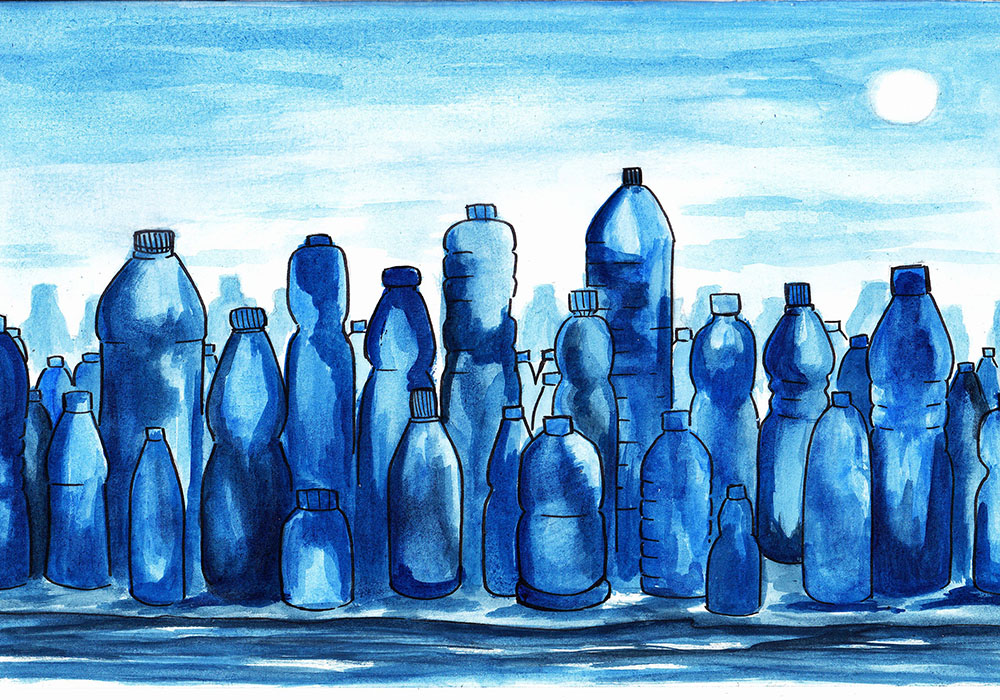York celebrated its commitment to phase-out water bottles on campus with a multidisciplinary display, Our Blue Future. The event included an art installation, film screenings, and panel discussions regarding water as a human right and the toll it takes on our environment. Organized by the president’s Sustainability Council, vice president finance and administration, York Federation of Students, and the Faculty of Environmental Studies, the event’s purpose was to create a “blue future” through artistic expressions.
The day started out with the art installation by the Faculty of Environmental Studies. The interactive installation included participants writing a message on a piece of paper, inserting it into a painted plastic bottle, and attaching it to a large fish drawing. The drawing was meant to educate students of the harm plastic water bottles are doing to our fish population. FES’ goal with this art piece was to eliminate the use of plastic water bottles around campus and to encourage students to utilize reusable water bottles filled from home, kitchens, or water fountains.
The event also featured a keynote addressed by Maude Barlow, national chairperson of the Council of Canadians and chairs the board of Food and Water Watch, a Washington-based organization aiming to ensure healthy food and water to all.
“[Barlow’s] speech was by turns frightening, as she outlined the serious threats to clean and accessible water around the globe. She outlined the activism working on water issues,” says Noël Sturgeon, Dean of Faculty of Environmental Studies.
[su_row]
[su_column size=”1/2″]
The film screenings included The Story of Bottled Water, a short five minute film co-created by The Story of Stuff Project, Corporate Accountability International, Food and Water Watch, Polaris Institute, Pacific Institute, and Environmental Working Group. This film tells the story of manufactured demands and how the bottled water industry attacks the use of tap water by installing fear in people by making them think tap water is not safe nor clean to consume. The bottled industry then uses seductive ways to advertise bottled water, which is partially tap water, to sell back to consumers for a profit.
[/su_column]
[su_column size=”1/2″]
[su_youtube_advanced url=”https://www.youtube.com/watch?v=Se12y9hSOM0″ width=”440″ height=”300″]
[/su_column]
[/su_row]
Christy Joy, a fifth-year psychology student says that packaged water is no better than tap water.
[su_pullquote]“We are paying so much (for bottled water) each week, month, and year giving a fortune to the industry for drinking water which essentially is our right.”[/su_pullquote]
The film concludes by encouraging viewers to end the use of buying plastic water bottles and to start drinking water from their tap which is virtually free and safe to consume.
In addition, Tapped, a film directed by Stephanie Soechtig and Jason Lindsey, examines the use of plastic water bottles and the effects it has on our health, climate change, and the amount of pollution it creates in the world. Plastic bottles that are discarded are not always recycled, ending up in landfills or washed down into lakes, rivers, and oceans. The cycle of not recycling affects the aquatic animal population and ends up washing up our shores to impact our beaches and the entire ecosystem.
[su_row]
[su_column size=”1/2″]
[su_youtube_advanced url=”https://www.youtube.com/watch?v=72MCumz5lq4″ width=”440″ height=”300″]
[/su_column]
[su_column size=”1/2″]
Ideally, through eliminating the purchase of plastic water bottles and no longer bringing them into post-secondary institutions, school boards, and municipalities, our plastic planet can become a bit more green and blue.
“I believe small changes can make a big difference. A small change like buying a reusable water bottle and using it can have a huge impact on the environment,” says Sheila Shahrokhi, a fifth-year student studying kinesiology and health science.
[/su_column][/su_row]
Water is a human right and we are fortunate enough to live in a country where clean water is as easily accessible as turning on the tap. It is our humane duty to bring back tap water and encourage others to drink the free, clean, and pure liquid that is right in our kitchen.
Viginthiny Paramananthan, Contributor
Featured illustration by Miny Pham


